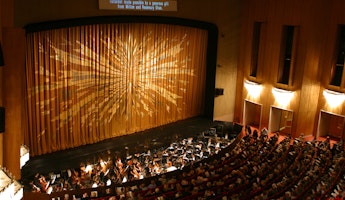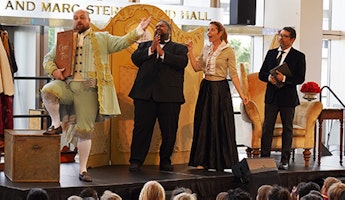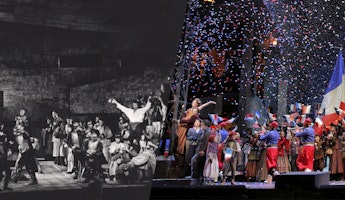Blog
July 23, 2023
A Lear Influence: "Succession" and Opera
Another season of TV has come to an end, as evidenced by the release of Emmy nominations. While there are many Emmy-nominated shows that we’ve loved, there was one that undeniably stood out.
HBO’s Succession, created by Jesse Armstrong, captivated the world this past year. The celebrated drama follows a media mogul’s decision to step aside and choose his successor, and the explosive repercussions. With a hyper-dramatic story, subtle comedy, and tense family dynamics heightened by Nicholas Britell’s brilliant classically influenced score, Succession reminds us of the musical art form we love so much. If Britell and Armstrong ever decide to adapt Succession as an opera, they’d have a hit on their hands. (Jeremy Strong, the actor behind Kendall Roy, has already proven his musical chops with a truly unforgettable performance of “L to the OG.”)
To explore another link between Succession and opera, we’d have to look at one of the art world’s—and perhaps Armstrong’s too—favorite founts of inspiration: William Shakespeare.
Shakespeare’s influence on Succession has not gone unnoticed by fans. Easter eggs abound, from Logan Roy’s distaste of the Bard to Frank stalling for time by referencing Much Ado About Nothing. The characters themselves also embody Shakespearean archetypes, with Macbeth, Julius Caesar, and Titus Andronicus reflected in Logan’s brutal, power-hungry nature. Yet the most obvious Shakespearean influence by far is King Lear.
In the original play, the aging King Lear decides to split his kingdom amongst his three daughters. Out of foolish pride, he misunderstands the devotion of the youngest and banishes her, leaving his realm to the two undeserving daughters...with dire consequences for everyone. The powerful-but-vulnerable Logan Roy and his three scheming children are counterparts for Lear and his daughters.
King Lear seems tailor-made for an operatic adaptation, and in fact, Giuseppe Verdi (a major Shakespeare fan who scored operatic versions of Macbeth, Othello and The Merry Wives of Windsor) worked with his librettists for years to adapt King Lear before finally abandoning the project without writing a single note. He later confessed that he was terrified and intimidated by the heartbreaking scene of Lear wandering the moors carrying the body of his beloved daughter.
Luckily for us, the play was eventually adapted into an opera by German composer Aribert Reimann. First performed at Munich’s Bavarian State Opera in 1978, Reimann’s Lear follows the original pretty faithfully. The title role was created especially for the legendary German baritone, Dietrich Fischer-Dieskau, who starred in the premiere. Now considered a modern classic, Lear has been produced by major opera houses throughout Europe and North America. San Francisco Opera offered the American premiere (in English translation) in 1981, with Thomas Stewart taking over the title role. Recent stagings include prominent presentations at the Paris Opera in 2016, the Maggio Musicale Fiorentino in Florence in 2019, and a major revival at the Bavarian State Opera in 2021.
For viewers captivated by the Roy children vying for power, Reimann’s Lear is a must-listen. The story has stood the test of time, and Reimann’s score brings the twisted familial tragedy to new heights. Just like Jesse Armstrong, we can’t get enough of Shakespeare, and we recommend Lear for any Succession fans missing their regular dose of drama.








/03-cosi/_dsc0996_pr.jpg?format=auto&fit=crop&w=345&h=200&auto=format)















